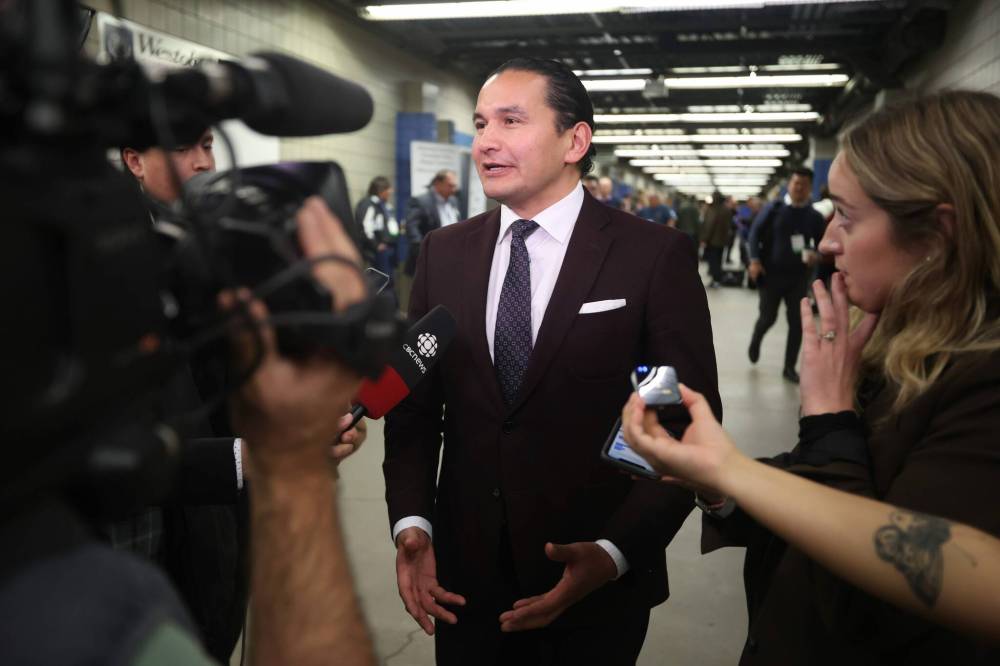Kinew threatens action against grocery chains if gas tax savings are not passed to consumers
Advertisement
Read this article for free:
or
Already have an account? Log in here »
We need your support!
Local journalism needs your support!
As we navigate through unprecedented times, our journalists are working harder than ever to bring you the latest local updates to keep you safe and informed.
Now, more than ever, we need your support.
Starting at $15.99 plus taxes every four weeks you can access your Brandon Sun online and full access to all content as it appears on our website.
Subscribe Nowor call circulation directly at (204) 727-0527.
Your pledge helps to ensure we provide the news that matters most to your community!
To continue reading, please subscribe:
Add Brandon Sun access to your Free Press subscription for only an additional
$1 for the first 4 weeks*
*Your next subscription payment will increase by $1.00 and you will be charged $20.00 plus GST for four weeks. After four weeks, your payment will increase to $24.00 plus GST every four weeks.
Read unlimited articles for free today:
or
Already have an account? Log in here »
Hey there, time traveller!
This article was published 01/12/2023 (821 days ago), so information in it may no longer be current.
Manitoba Premier Wab Kinew fired a shot across the bow of grocery retailers on Thursday, threatening to take action if the savings they experience as a result of his government’s impending gas tax freeze are not passed down to consumers.
“You’ve heard the big chains, the billionaires owning these big chains talk about ‘Oh, it’s transportation costs that are the reason why grocery prices are going up,’” Kinew said to delegates on the final day of the Association of Manitoba Municipalities fall convention in Brandon.
“Well, guess what? We’re calling their bluff. Transportation costs will be reduced for the big grocery chains starting on Jan. 1 and if they don’t pass the savings to you, then we will take further action to follow up with that.”

Manitoba Premier Wab Kinew answers questions from reporters after taking part in the bear pit session at the Association of Manitoba Municipalities fall convention at the Keystone Centre on Thursday. (Tim Smith/The Brandon sun)
Following up on a campaign promise, the NDP have introduced legislation that would pause the 14-cent-per-litre provincial tax on gasoline, diesel and natural gas from Jan. 1, 2024 through the end of July, with an option to extend the pause if inflation remains high.
Speaking to reporters after a ministerial forum, the premier said he would like to “see those savings be realized immediately” at a commensurate level to the amount the grocery retailers save on fuel.
Though Kinew did not comment on what action the province would take if grocery prices don’t come down, he did say he had taken an interest in steps the federal government is looking into on grocery affordability and that Agriculture Minister Ron Kostyshyn has been engaging with them on the topic.
Reached by phone, Heritage Co-op general manager Dennis Laing told the Sun that fuel costs are only one factor in determining the price of the goods they sell. Heritage Co-op operates food stores in Brandon, Minnedosa, Sandy Lake, Rivers and Erickson, as well as gas stations in Brandon, Wawanesa, Minnedosa, Erickson and Strathclair.
“Team members of Heritage Co-op are also consumers,” Laing said. “We understand and look forward to any break that may be coming. As a business, we look forward to the government sharing information about the implementation and execution of this … Until that is done, we really have no insight into what the implications, positive or negative, may be to the cost of procuring goods.”
Other factors in determining the price of goods, Laing said, include the wages paid to staff — and the province has already seen two recent larger-than-normal increases to the minimum wage.
Since Heritage Co-op has to pay the provincial sales tax on fuel it acquires for sale, Laing said he wondered if retailers will be reimbursed for fuel it sells to consumers without the tax in place.
Sylvain Charlebois, a professor in food distribution at Dalhousie University in Halifax, told the Sun by phone that it’s dangerous for a government to make that kind of guarantee to the public because many factors determine grocery prices.
“The Bank of Canada has actually made that mistake before,” Charlebois said.
“If you actually think that by eliminating tax, or something like that, consumers can benefit — not necessarily. Typically, you would see prices go up or being readjusted as a result. It may actually last a little bit. But eventually, if the market is trained to see a certain price, typically companies will take advantage of that.”
To really guarantee savings on groceries, Charlebois said, you would have to regulate retail prices, which is a worse idea.
What might actually lead to decreases in grocery prices, he added, is a drop in commodity prices.
In an email, Retail Council of Canada director of government relations for the Prairies, John Graham, added his voice to those saying that fuel costs are only one element making up grocery prices.
Other factors that have driven up grocery prices include global wars, extreme weather, supply chain disruptions, labour shortages and the weakness of the Canadian dollar.
“Temporarily reducing the taxes charged on fuel is a positive step towards helping lower food prices,” Graham wrote. “However, as noted, transportation costs are just one of many contributing factors to food prices that are generally outside of the control of retailers.”
He added that his organization would welcome a more comprehensive discussion with Manitoba’s new government on how they could reduce red tape and government costs that negatively impact the price of food and other retail goods.
» cslark@brandonsun.com
» X: @ColinSlark
